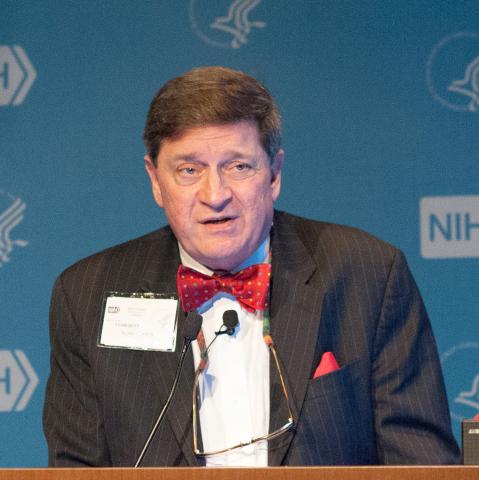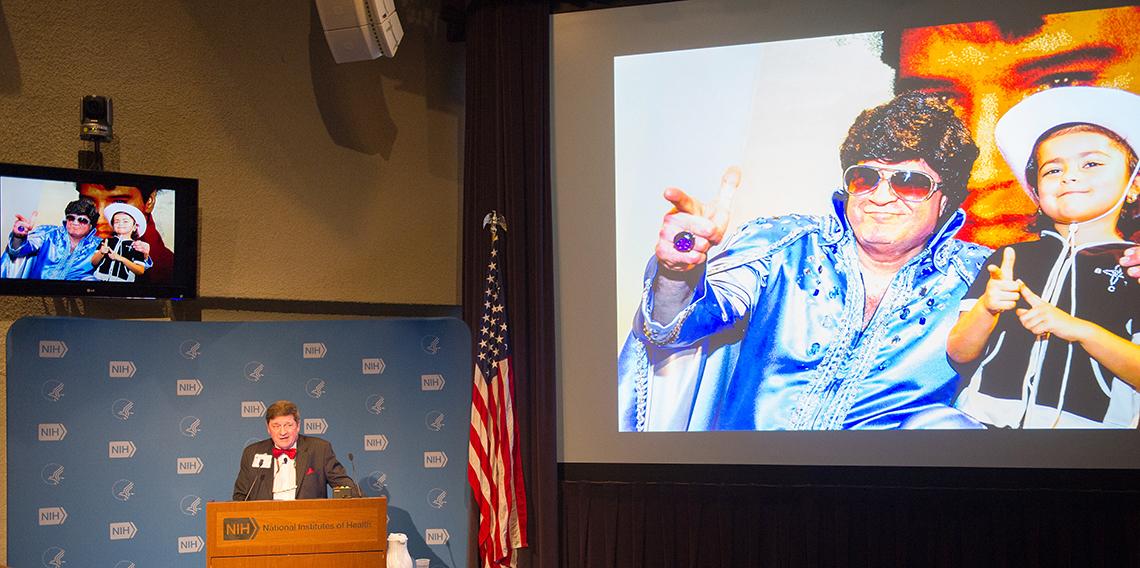Hopkins’ Cohen Emphasizes 3 H’s of Patient Care

Photo: Marleen Van Den Neste
I don’t know about you, but if someone is going to do brain surgery on me, I want a surgeon as skilled at making pot jokes, enlivening the history of neurosurgery with anecdotes from Maimonides, Twain and Da Vinci and schooled in Elvis impersonation as Dr. Alan R. Cohen, professor of neurosurgery and Carson-Spiro professor of pediatric neurosurgery and chief of pediatric neurosurgery at Johns Hopkins University School of Medicine.
In his Grand Rounds/Great Teachers lecture “The Art of Neurosurgery” on Nov. 8 in Lipsett Amphitheater, Cohen proved not only deeply immersed in the history of his field, but also acutely aware of the hunger patients have, especially those with grievous diagnoses, for treatment that embodies what he called the “three H’s—humility, humanity and humor.”
Neurosurgery is a relatively new field, having been born early in the last century, and Johns Hopkins was its cradle. That was where Dr. Harvey Cushing, the father of what was once known as “the special field,” practiced medicine, giving birth to what today is still a relatively small fraternity.
Cohen specializes in minimally invasive pediatric neurosurgery. In a book he published last year—The Art of Pediatric Neurosurgery: Tricks of the Trade—he offered “nuances of how to stay out of trouble, or get out of it once you’ve gotten into trouble.” His talk focused on the non-technical side of his work.
The Latin phrase Ars longa, vita brevis (Art is long, life is short) became a theme. “There is so much information we need to accumulate [to practice neurosurgery] that a lifetime is not long enough to do that. And that is true for technical and non-technical aspects of the field.”
Cohen acknowledges that “technology has revolutionized what we can do, but it comes with a price.” The modern physician is often in such a hurry that simply listening to the patient is becoming a lost art.
Cultivating an appropriate bedside manner “is little discussed in medical school, but it is at least as important as the technical aspects.”
Physicians are also saddled with online paperwork in the form of the electronic health record, “which is not taken terribly seriously by most of us—it’s an automated billing generator, really… If we spent as much time with the patient as we did on coding, we’d do a better job.”
The so-called EHR, which Cohen labels DOD, or degradation of documentation, is a symptom of a kind of mechanization in medicine that harms the profession’s foundation—the laying on of hands—which is being eroded in an era of technology.
“Patients are now considered ‘clients,’ and doctors are now ‘health care professionals,’” he lamented. “I don’t think the ‘laying on of hands’ refers to the computer keyboard…We forget that what is remembered most by our patients is often the simplest things we do.”
Cohen admitted, “Humility is not a word found in the lexicon of most of us in neurosurgery.” That virtue was evident in his dad, who finished first in his medical school class yet never told his wife. “Unfortunately, the humility gene did not appear to get transmitted down to me,” Cohen quipped.

Photo: Marleen Van Den Neste
Describing himself as “a yokel from Poughkeepsie,” Cohen got into Harvard College but soon found himself “in over his head.” While a letter of scholarship from Harvard became a source of family and community pride, Cohen was brought to Earth by the amount—$13.50.
“That taught me an important lesson in humility at an early age,” he said. Crucially, for physicians, “Patients know it when it’s not there,” warned Cohen.
“Humanity,” he continued, “is another non-technical pearl of what it means to be a doctor, a healer. But we’ve forgotten a lot about the personal connection to our patients.” Central to humanity is the concept of equanimity. “[Sir William] Osler [in his essay Aequanimitas] said it was a physician’s most important trait.”
Cohen said that the balance between being honest with patients while still offering hope is “a subtle but important factor in the art of healing.” He quoted Dr. Edward L. Trudeau, a beloved physician whose statue at Saranac Lake, N.Y., where he founded his sanatorium, bears his motto: “To cure sometimes, to relieve often, to comfort always.”
Offering his own “Monarch notes” summarizing his 10 Commandments of good physicianship, Cohen said, “Listen, empathize and offer hope…before you talk, hear.
“Caring means being troubled by someone else’s trouble,” Cohen said, quoting bioethicist Dr. Albert Jonsen. “A lot of important things are gray zones in the doctor-patient relationship…but we always have to offer something to hold onto.”
Or as Rudyard Kipling once said, “Words are…the most powerful drug used by mankind.”
The final H, humor, was where Cohen earned his scholarship with the crowd. He played an SNL-worthy video clip of himself as a self-involved surgeon utterly botching an interaction with parents, played by actors, of a child with cancer.
Quoting Voltaire, he said, “The art of medicine consists of amusing the patient while nature cures the disease.” The twin pink Elvis lamps adorning Cohen’s office desk attest to his belief that “humor enables you to strengthen the doctor-patient bond…it is a powerful adjunct to healing.
“It’s important to realize what it’s like on the other side of the bed rail,” he said. “The three H’s make you a better healer and a better doctor…Patients have taught me more about the art of neurosurgery than I would ever learn in books.”
Cohen concluded with an admission that “the work is hard, but the rewards are rich…don’t forget to enjoy the ride.”
The complete lecture is available at https://videocast.nih.gov/summary.asp?Live=26616&bhcp=1.
